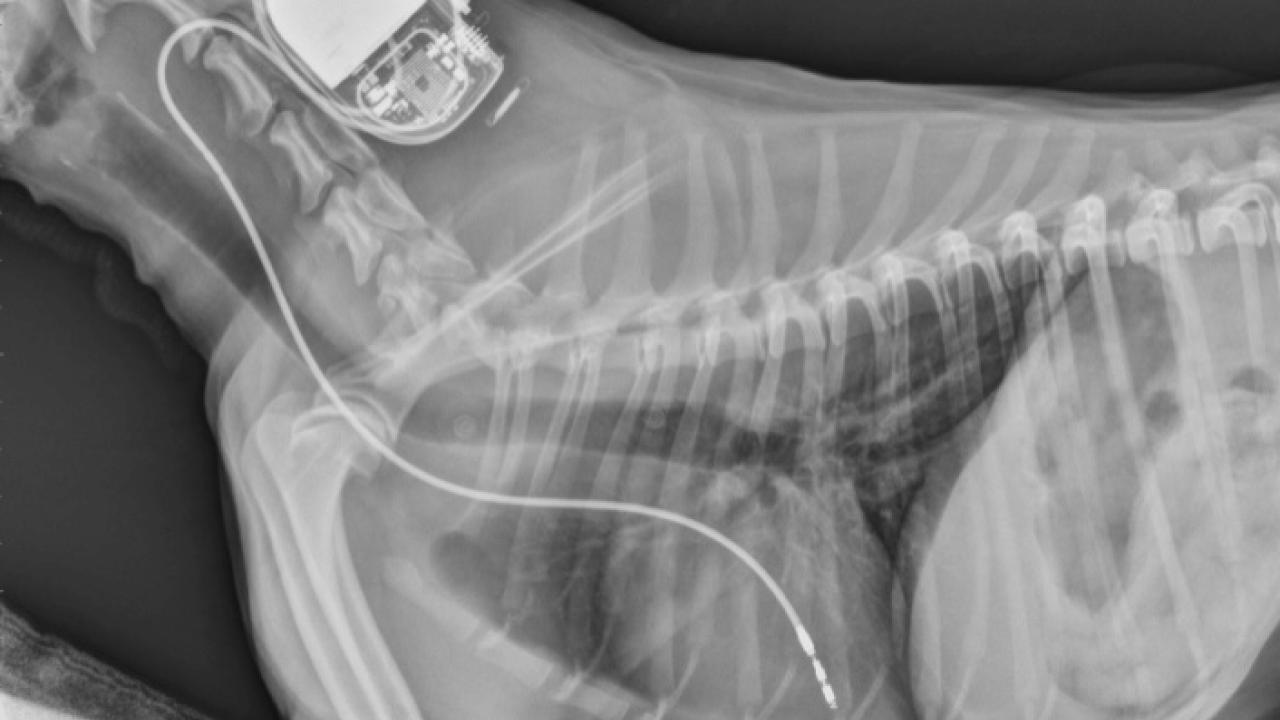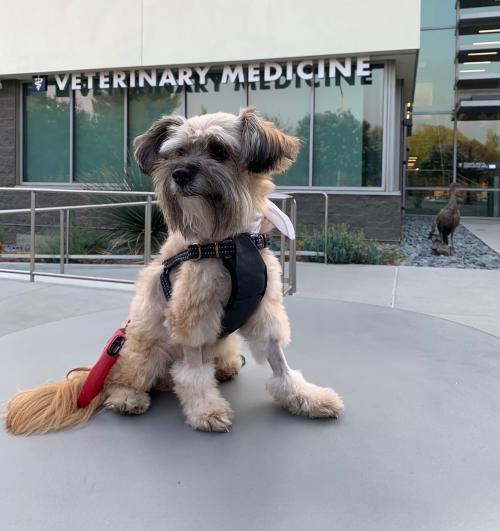
Cardiac Emergency Leads to Cross Country Journey to UC Davis
--Portions of this article first appeared in Pulse magazine--
Being faced with a life-or-death situation with their animals, many pet owners will go above and beyond to save them. This certainly was the case for Jason LeGrand and his husband Eric Burkholder of Auburn, Alabama, where the former California couple recently moved for Burkholder’s career as a physics professor at Auburn University.
When Zeus, their energetic 7-year-old male Shih Tzu/Schnauzer mix, became immediately lethargic and ill with bouts of vomiting and diarrhea, their primary veterinarian diagnosed him with a third-degree atrioventricular (AV) block, a conduction system disease of the heart. The veterinarian prepared LeGrand and Burkholder for the worst and informed them they would need to find a cardiologist who could implant a pacemaker in Zeus to save him.

Third-degree AV block occurs when the electrical impulse that tells the heart to contract does not properly spread through the heart. As such, the ventricular chambers in the heart do not receive the proper signals to contract and end up beating at a much slower rate. The block may be caused by a multitude of diseases, most commonly (and in Zeus’ case) a degeneration of the conduction system and scarring, most commonly occurring at an older age. Other causes include cancer of the heart, severe structural heart disease, infection or inflammation of the heart, and trauma. Dogs with third degree AV blocks often collapse from the low heart rate and are at a high risk for sudden death if the rhythm spontaneously stops. Over time, dogs are also at risk for congestive heart failure, as the heart has a difficult time compensating for the slow heart rate. This results in fluid buildup in the lungs, around the lungs, or in the belly.
The dedicated couple started looking at veterinary schools and specialty hospitals in the South but ultimately headed to the one place where they knew it could be handled – LeGrand’s former employer, the UC Davis School of Veterinary Medicine (SVM).
Having been a SVM fundraiser and a former client of the veterinary hospital, LeGrand knew just who to call to arrange for Zeus to be seen by the Emergency Room and the Cardiology Service.
Because dogs with third degree AV block are unfortunately at high risk for sudden death without pacemaker implantation, a timely intervention was vital. LeGrand and Zeus were on the next flight to California. Upon arrival at UC Davis, Zeus was admitted to the Intensive Care Unit immediately until his procedure, which took place within 48 hours of arrival.
The lead veterinarian on Zeus’ case at UC Davis was Cardiology Service resident Dr. Ashley Sharpe, a graduate of Auburn University College of Veterinary Medicine.
“I was excited to see they were from Auburn,” said Dr. Sharpe. “Veterinary medicine can be such a small world sometimes.”
Dr. Sharpe worked with faculty cardiologist Dr. Marisa Ames to successfully place a pacemaker, gaining control of Zeus’ heart rate. Zeus’ cross-country journey gave him a new lease on life, and UC Davis’ experience in placing pacemakers provided a vital training opportunity for Dr. Sharpe and other veterinary residents learning this life-saving procedure. UC Davis has the largest veterinary residency training program of any facility in the country.
“These veterinarians go to great lengths for their patients,” said LeGrand. “I knew them personally from having worked with them, but I feel they would do that for any client who comes to them, especially in emergency situations. Zeus’ case is the type of story that I would tell as a fundraiser for the school – these emergency life-or-death stories where UC Davis saves the day.”
LeGrand and Burkholder feel fortunate to now be the subject of the story instead of the narrator.
After several weeks of strict rest and expert follow-up care, Zeus seems to be back to his old self.
“He is so active that one would never guess he has this device in him,” LeGrand said. “Zeus doesn’t remember he was sick or know any better, so he’s just the same dog he was before.”
# # #
